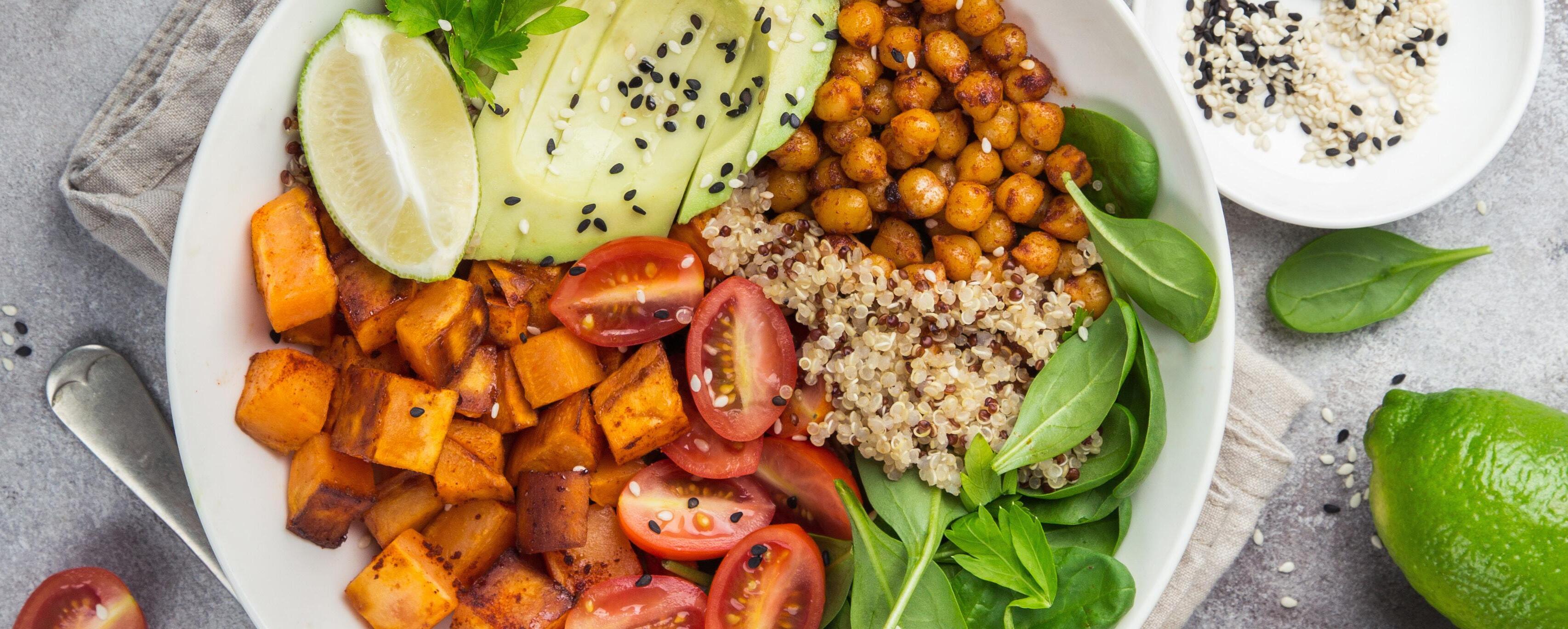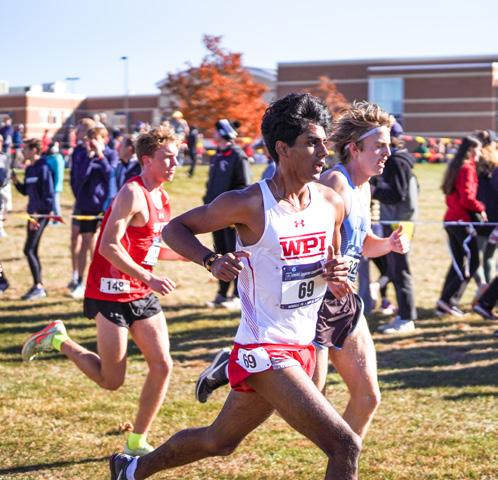

sports nutrition tips
by
energy needs
Feeling tired and inefficient with workouts or games? Are you consuming enough calories to meet your energy needs? The tips below may improve your workouts!
POTENTIAL SIGNS OF INSUFFICIENT CALORIES
• Chronic fatigue
• Recurring infections/illnesses
• Depression
• Inability to gain or build muscle or strength
• Poor performance
• Absent or irregular menstrual cycles
• Stress fractures
• Repeated bone injuries
• Decreased muscle strength
• Irritability
• Training hard yet not improving performance
• Stomach issues
• Weight loss
WANT TO INCREASE OVERALL CALORIES?
• 3 meals and snacks is a good way to start!
• Increase portion sizes of meals and/or snacks. For example, increase your protein portion by a third and double your carbohydrate portions.
• Add nutrient dense snacks such as trail mix with nuts, seeds, dried fruit, and chocolate.
• Add a glass of whole milk with meals or with snacks.
• Add peanut butter or cheese to crackers and fruit.
• Limit empty calories such as diet soda, plain tea, or coffee that may leave you feeling full but not add calories.
ADDITIONAL FACTORS TO CONSIDER
• Are you working out more than is recommended?
• Do you have adequate funds for sufficient food intake?
• Are you struggling with the concept of eating more?
• Please reach out to your coach or athletic trainer.
If you feel fatigued during workouts and games, it might be because you’re not taking in enough calories to fuel your energy demands. Wondering how many calories you should be consuming? Several methods can help estimate your needs, but they all provide rough figures. Feel free to reach out to Shavaun Cloran, scloran@wpi.edu, to assist in helping you meet your individual caloric needs.

CARBOHYDRATE RECOMMENDATIONs
• Carbohydrate (CHO) is the primary fuel source for moderate and high-intensity exercise
• The stored form of CHO in the muscle and liver is called glycogen, supplies most of this fuel and can be manipulated through diet and training
• CHO intake throughout the day, and before and after training and competition will help to ensure adequate glycogen stores
WHAT IS GLYCOGEN AND WHY IS IT IMPORTANT?
• A starch – long chain of glucose molecules and the storage form of glucose in cells.
• Muscle glycogen is a major energy source for muscle contraction and is only used by the muscle.
• Liver glycogen helps maintain blood glucose, which can be used by the brain and muscle during exercise.
• Glycogen stores are often a limiting factor for endurance performance. Once stores are low, the athlete will fatigue quickly, “hitting the wall.”
GENERAL RECOMMENDATIONS

CARBOHYDRATE LOADING
For athletes that are preparing to compete in an endurance-based event that lasts ninety minutes or longer, the Academy of Nutrition and Dietetics recommends beginning 36-48 hours before, consuming 10-12 g/kg body weight in carbs per 24 hours.
Protein recommendations
WHY IS PROTEIN INTAKE IMPORTANT?
Protein is needed for:
• Endurance exercise: protein required as an auxiliary fuel source.
• Strength exercise: amino acids required as building blocks for muscle development.
PROTEIN NEEDS BY ACTIVITY
Protein gm/kg body weight*
1.2-1.4
1.4-1.7
1.6-1.7
1.6-2.0

EXAMPLES OF NUTRIENT DENSE PROTEINS
Typical serving sizes and grams of protein provided.
Plant-Based
¾ cup tofu
½ cup cooked soybeans
½ cup cooked lentils
2 tbsp peanut butter
½ cup cooked beans
1 oz. nuts*
¼ cup hummus
2 tbsp seeds
½ cup cooked quinoa
Type of Activity/Sport
Endurance athletes, cycling
Basketball, hockey soccer, tennis, swimming track
Strength athletes, football, baseball
Extreme exercise and heavy weight-lifting
*general guidelines
Animal-Based
IS THE TIMING OF PROTEIN INTAKE IMPORTANT?
Yes! Spread your protein intake throughout the day. Aim for 20-30 grams of protein with meals. Excess high protein (chicken, beef, or tofu) may take away from balancing may take away from balancing your plate with veggies, whole grains, and fruits.
EXAMPLES OF PROTEIN-RICH MEALS
• Eggs with toast and yogurt
• Grilled chicken with veggies and quinoa
• Fish tacos with rice and beans and low fat milk
Exercise Fuel Timing Tips
THE NIGHT BEFORE ATHLETIC EVENT
• Complex carbohydrates such as pasta, quinoa, brown rice, lentils, potatoes
• Vegetables
• Lean protein such as meat, fish, poultry, legumes, tofu
• Dairy products such as milk/lactose-free milk or yogurt
• Fruits
3-4 HOURS BEFORE ATHLETIC EVENT
200-300 grams of carbohydrate
• Oatmeal with almonds, milk, banana
• Pancakes, fresh fruit, juice, yogurt
• Fruit and yogurt, smoothie, granola
• Cottage cheese, grapes, nut better, crackers
• Deli sandwich, fruit, pretzels, milk
• Tuna melt, fruit cup, yogurt, milk
30-60 MINUTES BEFORE BEFORE ATHLETIC EVENT
30-60 grams of carbohydrate (low fat/fiber per tolerance)
• Sports drink
• Granola bar
• Piece of fruit (if well tolerated)
• Jam sandwich
*Per tolerance: easy to digest CHOs
DURING COMPETITION
FOR SHORT EVENTS (1 HOUR OR LESS)
• Sports drink
FOR LONGER EVENTS (1 HOUR OR GREATER)
• Easy to digest 30-60 grams of carbohydrate
AFTER ATHLETIC EVENT
POST PERFORMANCE
Within 30 minutes post exercise event
• Eat 1-1.5 g carbohydrate/kg which stimulate the release of insulin, helping to build muscles and transport CHO into muscles to replenish glycogen stores.
• CHO combined with a small amount of protein (10-20 grams) produces a better response and reduces cortisol (a hormone that breaks down muscle).
RECOVERY SNACKS
• Crackers with peanut butter, chocolate milk, and banana
• Smoothie made with yogurt and fruit
• Sports drink and energy bar
2-3 HOURS POST ATHLETIC EVENT
Recovery Meal
• Deli sandwich with veggies, pretzels, milk
• Brown rice and beans with cheese, salsa, avocado, and tortilla chips
• Stir-fried lean steak, chicken, or tofu with a variety of veggies and brown rice or quinoa
• Egg and cheese wrap and yogurt parfait


















Allergies & Athletes
If you have allergen concerns in addition to nutritional concerns as a student athlete, Tech Eats has many resources to take advantage of.
Meet with our Registered Dietitian, Shavaun Cloran, and discuss your allergen or dietary needs, take advantage of our Gompei’s Guide to Mindful Dining as well as our Navigating Allergens Guide.

WHO IS SHAVAUN?
Shavaun Cloran, Registered Dietitian (RD), graduated from the University of Connecticut with a B.S. in Biology and subsequently completed her Dietetic Internship at Massachusetts General Hospital. She has worked in a variety of nutritional settings including clinical, research, outpatient and educational sectors, and is currently active in the higher education dining services.
In general, her role as an RD includes assisting those students with food allergies/Celiac Disease and other nutritional concerns. She meets with incoming students and families to help transition from home to the college dining setting by developing studentspecific plans and ensures coordination with the dining services staff. She develops and implements food allergy awareness and training for Tech Eats Dining associates.
